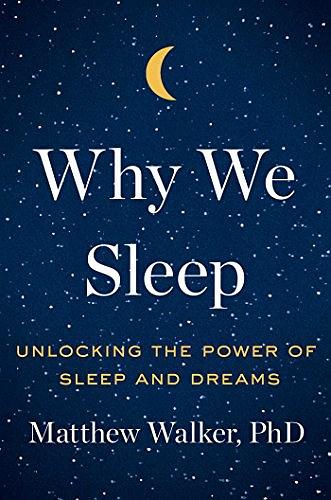The first sleep book by a leading scientific expert—Professor Matthew Walker, Director of UC Berkeley’s Sleep and Neuroimaging Lab—reveals his groundbreaking exploration of sleep, explaining how we can harness its transformative power to change our lives for the better.
Sleep is one of the most important but least understood aspects of our life, wellness, and longevity. Until very recently, science had no answer to the question of why we sleep, or what good it served, or why we suffer such devastating health consequences when we don't sleep. Compared to the other basic drives in life—eating, drinking, and reproducing—the purpose of sleep remained elusive.
An explosion of scientific discoveries in the last twenty years has shed new light on this fundamental aspect of our lives. Now, preeminent neuroscientist and sleep expert Matthew Walker gives us a new understanding of the vital importance of sleep and dreaming. Within the brain, sleep enriches our ability to learn, memorize, and make logical decisions. It recalibrates our emotions, restocks our immune system, fine-tunes our metabolism, and regulates our appetite. Dreaming mollifies painful memories and creates a virtual reality space in which the brain melds past and present knowledge to inspire creativity.
Walker answers important questions about sleep: how do caffeine and alcohol affect sleep? What really happens during REM sleep? Why do our sleep patterns change across a lifetime? How do common sleep aids affect us and can they do long-term damage? Charting cutting-edge scientific breakthroughs, and synthesizing decades of research and clinical practice, Walker explains how we can harness sleep to improve learning, mood, and energy levels; regulate hormones; prevent cancer, Alzheimer’s, and diabetes; slow the effects of aging; increase longevity; enhance the education and lifespan of our children, and boost the efficiency, success, and productivity of our businesses. Clear-eyed, fascinating, and accessible, Why We Sleep is a crucial and illuminating book
1、追日是作者栎年创作的原创作品,下载链接均为网友上传的的网盘链接!
2、相识电子书提供优质免费的txt、pdf等下载链接,所有电子书均为完整版!
-
美丽雉科废青的评论总之,鼓吹每天睡三小时看四点钟的洛杉矶,是现代人类最愚蠢的观念之一。普通的说,这本书讲的很多新研究结论很有意思,比如晚上喝酒、吃褪黑素对睡眠其实危害巨大。但是我更看重作者的私货:“既然演化让几乎所有动物都具有睡眠这种近乎自杀性的行为,那么一定有什么重要得要命的理由。”作者对这个理由的猜测是我见过的最接近准确的答案:nREM睡眠是腾空临时记忆空间,而REM睡眠是将这些存储转移到永久存储中;而梦的作用是让人对一段记忆安全地去除感情。
-
没有色彩的红魔的评论介绍了很多比较新的关于睡眠和梦的实验和理论,挺好的。另外也附有很实用的助睡指南,最关键的一条:每天按时睡觉按时起床。
-
ichbinluz的评论实话实说我感觉比较一般,话题是老生常谈了,睡觉很重要,重要到睡不好会导致种种疾病甚至死亡。也可能是我get不到当中的逻辑。前几个月开始听,一直很催眠,到今天终于决定听完。也许催眠就达成了这本书的目的吧。睡前读纸质书和电子书还是有差的,读电子书会抑制身体释放melatonin。不用错觉自己insomnia,being sleep deprived is not insomnia。不过being sleep deprived也没有比insomnia好到哪里去。
-
彻的评论睡眠不足的危害微信微博上到处可见。这本书简单来说就是再次重申睡眠不足对于身体,情绪等各方面的负面影响。我觉得比较有意思的是,原来REM做梦的时候,身体应该是处于paralyzed的状态的,大脑好神奇。还有sleep on it是有科学根据的。有的篇幅略冗余。总结下来睡眠很重要,要重视,说起来比做起来容易,要真正做到不简单。
-
ShD的评论Rem is important. Deep sleep is important. Regular sleep time is important.
-
[已注销]的评论非常有意思的睡眠科普。做梦帮助形成长期记忆和抽象学习,但是无论褪黑素和安眠药都不能制造真实睡眠的脑波。酒精抑制皮层活动更是阻碍REM。人体自有生物节律,就算黑暗中也会维持恒定睡眠周期(略大于24小时)。睡眠不足造成诸多次要机能受影响并且容易饮食过量,可能是远古生存压力留下的进化痕迹。睡觉认床也被认为是进化压力。睡眠本身有激发免疫系统的功效,所以重症感染会导致嗜睡,睡眠不足也会诱发癌症和免疫机能下降。蓝光干扰褪黑素分泌,但是也可以用来控制调整睡眠周期。最后面关于延长睡眠和节约社会成本的部分略扯,社畜哪...
-
Eva七七的评论《Why We Sleep》的作者是一位名叫Matthew Waler的睡眠学专家,看完了这本书,才明白「晚上睡不好」带来的问题,绝对不仅仅是「白天很疲倦」,而是非常非常可怕的各种智力低下、生理疾病、心理障碍、性格缺陷,甚至有生命危险。关键这些结论都不是凭空臆造,而是经过二十多年无数例的科学试验得出的。 睡眠比饮食和运动更重要。如果剥夺一个人睡眠、或食物、或运动24小时,睡眠伤害最大;每晚睡少于6小时的45岁以上的人,比睡7-8小时的人得心梗和脑梗的概率高200%。睡眠不足会变傻,容易得老年痴呆症。 虽然看似老生常谈,但睡眠这个看似...
-
elimu的评论给自己爱睡觉找到了理由,发现确实如此
-
pluskid的评论非常有用也比较有意思的一本书,向所有读者群推荐(NY Times Bestseller)。书以一个问题开始:我们(虫鱼鸟兽一切动物)为什么要睡觉?为什么生物经过这么漫长的进化,还一直保留着睡觉这个看起来会极大降低存活率(比如睡着了很容易被偷袭)的机制?水里需要不停游动的鱼类,或者需要跨洋级别长期飞行的鸟类都各自进化出了一些像一次只睡半边脑之类的 workaround 也无法完全避开睡觉,究竟是为什么? 当然书并没有给出答案的完整刻画,因为完整的刻画应该还是生物研究中的谜题之一,但是书给出了一个很重要的定性答案:睡觉并不(仅仅)...
-
等待如果的评论也许并不是动物进化出了睡觉这件事,而是动物最原始的状态就是睡眠状态,进化让动物能周期性地“醒过来”If sleep does not serve an absolutely vital function, then it is the biggest mistake the evolutionary process has ever made. Wake: reception,NREM: reflection (storing&strengthening raw ingredients), REM: integration (interconnecting,building a more accurate model, innovative insights&problem-solving
